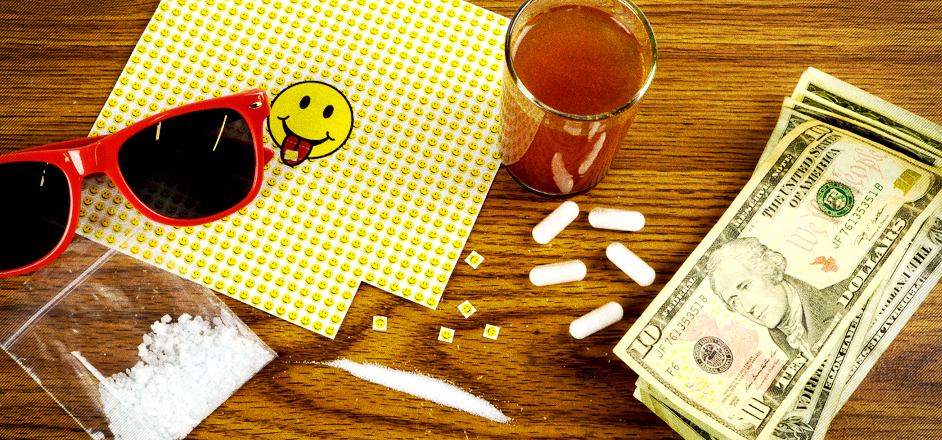Psilocybin delights more than Yeezy Boosts, It's proven …
Evidence exists that buying shit — whether cheap plastic Chinese crap, Zales’s clear carbon rocks or Bed Bath and Beyond’s mother of pearl faucet handles — not only won’t make you happy, it might make you miserable.
You know this. You read Eckhart Tolle. You saw Waste Land. You bought vinyl bar stools in March and regretted it in August. And, yet, you studied system architecture in college and you show up to the office. And so you’ve got some screw-you money. So what are you gonna spend it on?
Overall, psychologists suggest that, if you want to be happy, you should buy experiences, not things. They usually suggest travel, concerts, charity, art and food.
But be real. Charity? Why should poor people get what you earned? Travel? There’s too much zika out there.
So what then?
Have you considered drugs?
Drugs can be tricky to locate and hazardous to store, but they are exactly what psychologists suggest you spend money on: Memorable experiences with opportunities for happiness that Macy’s and Saks can’t offer, even during big clearance sales.
The obvious objection is that “drugs are wrong.” There are two possible responses. First, we could argue the facts, and point out that while many drugs can be damaging, studies suggest that MDMA facilitates therapy, LSD aids depression, ayahuasca regrows brain cells, and mushrooms treat PTSD — and how’s any of that wrong? Second, we could follow the teachings of Epictetus and Marcus Aurelius, who instruct us to examine each thing for what it is, to reserve judgement about “right / wrong” and “good / bad,” and only speak about semi-measurable properties like “endogenous molecules” and “default mode network deactivation” and “anterior cortical thinning” and “faces tripped.”
Take MDMA, for instance, and watch what it does without judgment. In even the most puke-stained RiNo dive brewery, you’ll absorb the music and feel the light and adore everyone around you as brilliant star children. Of course, the morning will break and you’ll realize how average your crew is and how tone deaf the DJ. But, still, ask whether that drug delighted you more or less than the new Yeezy Boost 750s.
Or sit in a safe space and chug some ayahuasca. After you’ve visualized yourself ejecting from your body into black space, sliding the Slip 'n' Slide of an intergalactic wormhole toward the brightest light, and after you’ve realized that the galaxy is your body and the Slip 'n' Slide is actually an axon in your own head and the light is your own cerebellum — then evaluate whether drugs are more or less valuable than your Odaingerous leather jacket (endorsed by Lindsay Lohan).
Many drugs aren’t fleeting or meaningless. In one study, the world’s chillest doctors gave subjects psilocybin, and 94 percent of the subjects said it was in the top five most meaningful experiences of their lives, and 39 percent said it was the absolute most meaningful experience. And this was during a scientific experiment in a quiet room; if it had been at the Arise Festival, it would’ve been a billion percent. Meanwhile, no one ever described “updating my kitchen backsplash” as their most meaningful experience, unless they were also hosting an HGTV show while also being paid by a backsplash company while also smoking DMT.
Listen! Not all drug experiences are created equal.
Take heroin. The Stoic philosophers say we shouldn’t judge “good / bad” or “right / wrong,” but even Marcus Aurelius and the world’s biggest minimalists would suggest you buy pods worth of Sharper Image crap, storage lockers full of AirMall shit, and max out your credit cards on QVC gold before you buy one single spoonful of heroin’s hot liquid death.
“Don’t do heroin,” is allegedly a direct quote from Socrates. “Sure, it will save you time, what with no more teeth to floss, but it’s also the quickest way to burn through all your paper and begin living in a cigarette-based economy, or a trick-based one.”
“And don’t do hemlock,” Socrates concluded. “I learned that one the hard way.”



Leave a Reply